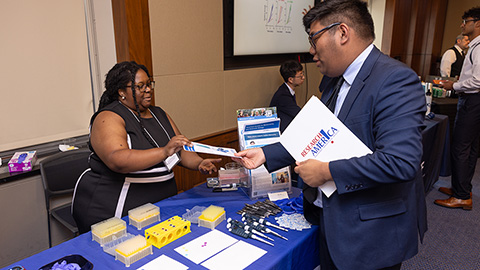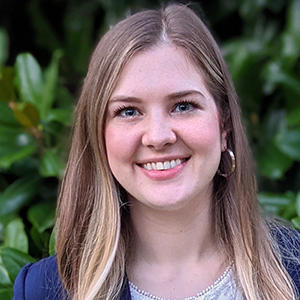NIGMS: Highlights from 2022 and what to expect next
The National Institute for General Medical Sciences supports approximately a third of the American Society for Biochemistry and Molecular Biology’s federally funded investigators and a variety of training and fellowship programs.
Last year, the NIGMS continued funding programs that the society broadly supports, such as Maximizing Investigators’ Research Award, Maximizing Opportunities for Scientific and Academic Independent Careers, and Institutional Research and Academic Career Development Awards.
The institute also created new mechanisms in 2022 to enhance diversity in biomedical sciences, such as the Leading Equity and Advancing Diversity in the Medical Scientist Training Program and Supplements to Recognize Excellence in DEIA Mentorship, and it developed more resources (e.g., webinars and science education materials) to inform and support its research community.
In 2023, we expect to see the NIGMS continue its legacy of supporting basic science and its vibrant scientific community.
In a statement, NIGMS Director Jon Lorsch told ASBMB Today that the agency broadly plans to stick to its strategic vision.
“At the heart of everything we do is an emphasis on careful stewardship of taxpayer funds through data-driven decision-making. A key tenet of our strategic vision remains supporting a broad and diverse portfolio of scientific topics, approaches, investigators and institutions. Years of evidence backs the value of portfolio diversity,” Lorsch wrote.
Here’s a few NIGMS programs and policies to keep your eye on.
More of MIRA
The MIRA program is revolutionizing basic biomedical sciences. The program provides funding for five years, one year more than the traditional research project grant (known as an R01). MIRA funds people, not projects, which gives researchers the flexibility to go where the science leads them. It also has stellar renewal rates.
The unique structure of the MIRA program increases the stability and sustainability of fundamental biomedical research. Therefore, the ASBMB strongly supports it and has advocated for its continuation. In fact, the ASBMB requested in February 2022 that the NIGMS expand the program. In June, the NIGMS announced it would.

MIRA now will support new investigators (those who have not received NIH funding previously) and allow renewals on all awards. The NIGMS also recently reissued MIRA for early-stage investigators beginning this spring and increased the application cycle from once to twice a year.
“Part of our strategic plan through 2025 is to broaden the diversity of the (early-stage investigator) MIRA applicant pool and encourage submissions at an earlier career stage,” Lorsch explained.
At the NIGMS Advisory Council meeting in September, leaders outlined their goal to increase the median MIRA budget for established investigators from $260,000 to $300,000 in direct costs, which would be well received in these times of economic hardship.
Lorsch indicated he’s confident that the NIGMS will continue investing in MIRA.
“We’ll continue our overall support for investigator-initiated research by assessing, enhancing and expanding our MIRA program in the coming years,” he wrote.
Watch this webinar to learn more about the MIRA program.
Adjusting to the new data-sharing policy
The new National Institutes of Health data management and sharing policy will be effective Jan. 25. This requires investigators of research project grants to provide public access to scientific data, where “scientific data” was defined as data “of sufficient quality to validate and replicate research findings, regardless of whether the data are used to support scholarly publications.”
The NIGMS recently shared specific information about compliance and its expectations, stating that the policy “will formalize what (principal investigators) already do and make explicit the expectations of their scientific community for sharing of data.”
To briefly assess the requirements of the policy, you can refer to the ASBMB’s guide. A plethora of resources and more detailed information can be found on the NIH’s data-sharing webpage. ASBMB members can access additional resources for their data management via the FASEB DataWorks! Help Desk.
The ASBMB public affairs team will continue to advocate to ensure researchers’ effort and time are not burdened or impeded significantly as a result of implementation of the policy.
Possible stipend increases
When the ASBMB Public Affairs Advisory Committee met with the NIGMS in the summer, its members shared their concern that the stipend for the Ruth L. Kirschstein National Research Service Award does not cover graduate students’ expenses. The NIH has made a concerted effort in recent years to ramp up stipend increases for postdocs but not for graduate students.
At the NIGMS Advisory Council meeting in September (see video at time stamp 37:30), officials considered the feasibility of increasing NRSA stipend levels for graduate students.
Across the biomedical sciences, graduate program stipends are about $32,000 per year, but NRSA awards provide about $5,000 less. The council debated the impact and feasibility of increasing the NRSA stipend amount to $30,000 or $35,000.
“This is a very complicated discussion with a lot of moving parts and a lot of consequences both intended and unintended,” Lorsch said at the meeting.
Officials raised the concern that raising the stipend would make high-resourced institutions richer more than it would help the students who need it.
“The NIGMS is continuing to look carefully at additional ways we can help support trainees, but institutions need to do the same,” Lorsch told ASBMB Today.
Lorsch said that NRSA stipends “are not intended to cover the full cost of living expenses for trainees” and said that institutions need to provide, for example, “additional stipend support, subsidized housing, or other benefits such as childcare and health insurance.”
Of note, the NIH Advisory Committee to the Director recently convened the Working Group on Re-envisioning NIH-Supported Postdoctoral Training, which will investigate the barriers within the postdoctoral training system and offer recommendations to address them. This may lead to recommendations for the NIH to support postdocs better financially as well.
The ASBMB will continue to monitor developments on both fronts.

Boost to NIGMS mechanisms for enhancing diversity
Last year, the ASBMB advocated for boosts to diversity programs at the NIGMS and other science-funding agencies.
The society assisted the office of U.S. Sen. Ben Ray Luján, D-N.M., in formulating a “Dear Colleague” letter urging federal appropriators to increase funding for internships, tribal colleges and workforce-development programs. (Read our statement.)
Delegates during the ASBMB’s annual Capitol Hill Day and Advocacy Training Program mini-Hill Day also advocated for investments.
In particular, the ASBMB has been vocal about supporting the Maximizing Access to Research Careers research training program, the Maximizing Opportunities for Scientific and Academic Independent Careers program, and the Institutional Research and Academic Career Development Awards program, all of which are run by the NIGMS.
“More support for programs like MOSAIC and IRACDA is warranted because these grants provide support for the development of a diverse workforce in biomedical research, particularly at the critical stage of transitioning postdocs to independent faculty positions,” said Ann West of the University of Oklahoma, member of the ASBMB PAAC.
Lorsch seemed to be of similar mind, sharing that “the NIGMS remains heavily invested in developing a skilled and diverse biomedical research workforce through training programs that promote effective mentorship and inclusive environments.”
In particular, Lorsch pointed to the MOSAIC program: “We expect to see more MOSAIC scholars transitioning to the R00 phase this year.”
Earlier this year, the ASBMB submitted written testimony to the U.S. House Appropriations Subcommittee on Labor, Health and Human Services, and Education requesting support for the NIGMS and its diversity programs in fiscal year 2023.
The fiscal 2023 spending package, signed into law Dec. 29, not only provided increases to the NIH base budget, including the NIGMS, but also featured a special line item of $10 million for NIGMS diversity programs. (Read the full explanatory document here.)
To learn more about the funding and training opportunities available at the NIGMS, register for our informational webinar — “Finding the funds: NIGMS funding and training opportunities” — on Feb. 25.
Enjoy reading ASBMB Today?
Become a member to receive the print edition four times a year and the digital edition monthly.
Learn moreGet the latest from ASBMB Today
Enter your email address, and we’ll send you a weekly email with recent articles, interviews and more.
Latest in Policy
Policy highlights or most popular articles

Embrace your neurodivergence and flourish in college
This guide offers practical advice on setting yourself up for success — learn how to leverage campus resources, work with professors and embrace your strengths.

ASBMB honors Lawrence Tabak with public service award
He will deliver prerecorded remarks at the 2025 ASBMB Annual Meeting in Chicago.

Summer internships in an unpredictable funding environment
With the National Institutes of Health and other institutions canceling summer programs, many students are left scrambling for alternatives. If your program has been canceled or delayed, consider applying for other opportunities or taking a course.

Black excellence in biotech: Shaping the future of an industry
This Black History Month, we highlight the impact of DEI initiatives, trailblazing scientists and industry leaders working to create a more inclusive and scientific community. Discover how you can be part of the movement.

ASBMB releases statement on sustaining U.S. scientific leadership
The society encourages the executive and legislative branches of the U.S. government to continue their support of the nation’s leadership in science.

ASBMB and advocacy: What we accomplished in 2024
PAAC members met with policymakers to advocate for basic scientific research, connected some fellow members with funding opportunities and trained others to advocate for science.

